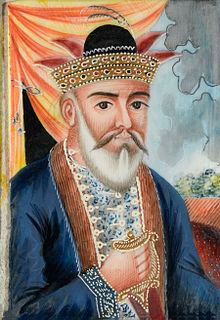| Dost Mohammad Khan دوست محمد خان | |||||
|---|---|---|---|---|---|
| Amir al-Mu'minin Amir-I-Kabir The Great Amir | |||||
 Miniature portrait of Dost Mohammad Khan c. 1835 | |||||
| Emir of Afghanistan | |||||
| Reign | Summer 1826 – 2 August 1839 1843 – 9 June 1863 | ||||
| Predecessor | Sultan Mohammad Khan | ||||
| Successor | Wazir Akbar Khan Sher Ali Khan | ||||
| Born | 23 December 1792 Kandahar, Durrani Empire | ||||
| Died | 9 June 1863 (aged 70) Herat, Emirate of Afghanistan | ||||
| Burial | |||||
| Spouse | 16 wives[2] | ||||
| Issue | 27 sons and 25 daughters at the time of his death[3] | ||||
| |||||
| Dynasty | Barakzai dynasty | ||||
| Father | Sardar Payinda Khan Mohammadzai (Sarfraz Khan) | ||||
| Mother | Zainab Begum[4] | ||||
| Religion | Sunni Islam | ||||
| Military career | |||||
| Battles / wars |
| ||||
Dost Mohammad Khan Barakzai (Pashto/Persian: دوست محمد خان; December 23, 1792 – June 8, 1863), nicknamed the Amir-i Kabir,[5][6][7] was the founder of the Barakzai dynasty and one of the prominent rulers of Afghanistan during the First Anglo-Afghan War.[8] With the decline of the Durrani dynasty, he became the Emir of Afghanistan in 1826.[9] An ethnic Pashtun, he belonged to the Barakzai tribe. He was the 11th son of Payinda Khan, chief of the Barakzai Pashtuns, who was killed in 1799 by King Zaman Shah Durrani.[3]
At the beginning of his rule, the Afghans lost their former stronghold of Peshawar Valley in March 1823 to the Sikh Khalsa Army of Ranjit Singh at the Battle of Nowshera. The Afghan forces in the battle were led by Azim Khan, half-brother of Dost Mohammad Khan.[10] By the end of his reign, he had reunited the principalities of Kandahar and Herat with Kabul. Dost had ruled for a lengthy 36 years, a span exceeded only by Zahir Shah more than a century later.
A brilliant strategist, and ruthless fighter from a young age, Dost Mohammad was regarded as one of the greatest rulers in the history of Afghanistan, his myriad of campaigns had successfully forged the cities of Kabul, Kandahar, and Herat into one state, which all his predecessors under the exception of Ahmad Shah Durrani had failed to do so.[11][12]
- ^ Dalrymple, W. (2013). The Return of a King: The Battle for Afghanistan. Borzoi book. Bloomsbury. p. 478. ISBN 978-1-4088-1830-5. Retrieved 15 June 2020.
- ^ H. Tarzi, Amin. "DŌST MOḤAMMAD KHAN". Encyclopedia Iranica. Retrieved 14 August 2021.
- ^ a b Tarzi, Amin H. "DŌSTMOḤAMMAD KHAN". Encyclopædia Iranica (Online ed.). United States: Columbia University.
- ^ "DŌST MOḤAMMAD KHAN". Iranonline. 15 December 1995. Retrieved 24 December 2020.
- ^ McChesney, Robert; Khorrami, Mohammad Mehdi (19 December 2012). The History of Afghanistan (6 vol. set): Fayż Muḥammad Kātib Hazārah's Sirāj al-tawārīkh. BRILL. ISBN 978-90-04-23498-7.
- ^ Yusuf, Mohamed (1988). A History of Afghanistan, from 1793 A.D. to 1865 A.D. New York University. ISBN 1466222417.
- ^ Kakar, M. Hasan (2006). A Political and Diplomatic History of Afghanistan, 1863-1901. Brill. p. 10. ISBN 978-90-04-15185-7.
- ^ Encyclopædia Britannica – Dost Mohammad Khan, "ruler of Afghanistan (1823–63) and founder of the Barakzay dynasty, who maintained Afghan independence during a time when the nation was a focus of political struggles between Great Britain and Russia..."
- ^ "Anglo-afghan wars", Encyclopaedia Iranica
- ^ Munshi.
- ^ Lee 1996, p. 288.
- ^ Dalrymple 2013: "He grew up to be the most dangerous of all the enemies of Shah Shuja and by 1809, at the age of seventeen, was already a ruthless fighter as well as a canny and calculating strategist."